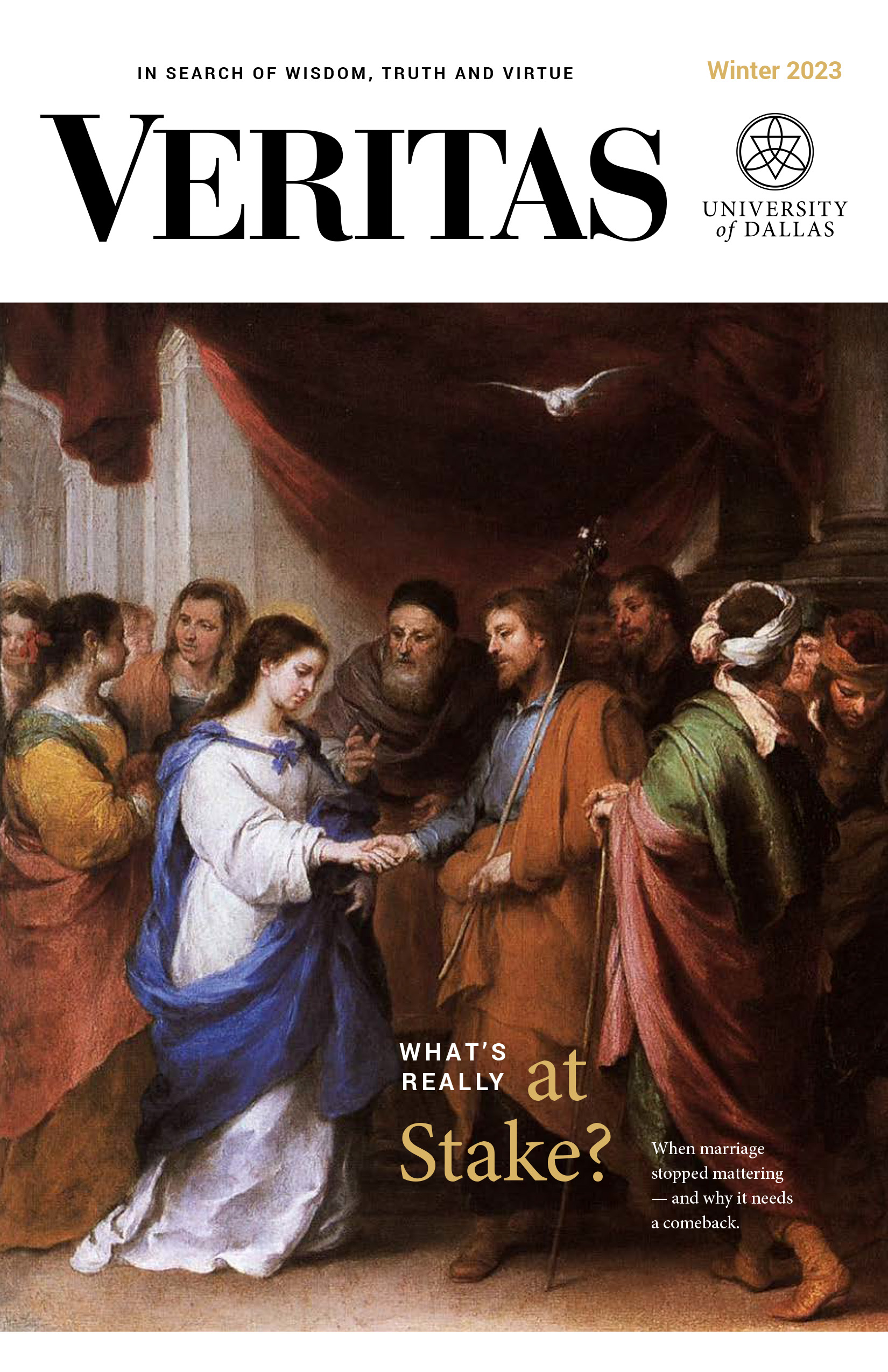Read This Issue
Enjoy the latest Veritas issue,
featuring Ryan T. Anderson, PhD.
Enjoy the latest Veritas issue,
featuring Ryan T. Anderson, PhD.
We invite you to check
out past issues of Veritas.
Help us reach more friends who love the true, the good and the beautiful.
Dear Friends,
One of the remarkable changes I have witnessed over the last two decades is that it has now become controversial to observe that marriage is an institution of fundamental importance to social stability. The controversial nature of that claim makes it no less true, and study after study coming out of the social sciences to this day confirms what has been recognized since the dawn of civilization, namely that one of if not the most important registers of societal health is the health of the institution of marriage.
The University of Dallas recognizes that wisdom, truth and virtue are the primary and proper ends of education, and our commitment to those ends is unparalleled. Our students learn to think clearly, to write persuasively and to speak with eloquence, and they are exposed to the full range of the human quest for wisdom.
They become attentive to first principles and learn to apply them to matters both timeless and timely, especially as they pertain to our common life together. What is justice and what does it demand for a flourishing social and political life? Deep reflections on the institution of marriage are part of the pursuit of just that sort of wisdom and the demands for virtuous action it entails.
Sincerely,

is the president of the Ethics and Public Policy Center. He is the St. John Paul II Fellow in Social Thought at the University of Dallas and the author or co-author of 5 books, including the recently released Tearing Us Apart: How Abortion Harms Everything and Solves Nothing. The following is adapted from a speech he delivered at the University of Dallas in February.

The Bible speaks of the two becoming one flesh. You see this both in Genesis and then in Matthew’s Gospel. The Bible is not merely speaking poetically or metaphorically but at a very real level; at both the physical and the metaphysical levels, a man and a woman when they unite in a conjugal act become one flesh. There are two ways of being embodied sexually — a male way and a female way. None of you has a reproductive system; each of us has half of a reproductive system. And when a man and a woman unite in that conjugal action, they form a whole, they become one flesh, as they form a complete reproductive system.
So, to my mind, it’s not surprising that once we redefined marriage to say that sexual complementarity doesn’t matter, the next cultural push was to say that sexual embodiment doesn’t matter. If you have a sexual revolution which says adults should do whatever they want to do with their bodies, why limit that to merely sexual actions? How about also sexual identities? Witness the move from LGB to T in recent years.

The very first piece of academic scholarship that I ever worked on was a law review article titled, “What Is Marriage?” While it’s been revealed to us in Scripture that marriage is the union of husband and wife, this is also one of those truths written on the heart. This is one of those truths that non-Christians have known throughout human history; more or less every political community that lasted long enough to leave a record of itself understood that marriage united the two halves of humanity, male and female, for the sake of bringing a man and a woman together as husband and wife to father and mother any children that that union could create. That’s more or less been the historic norm all throughout the globe. Even in cultures that practice polygamy at the elite level — where a high-status male might have multiple wives — for everyone else, it was a man and a woman in what was presumptively going to be a permanent and an exclusive relationship. Even though we’ve seen various changes in divorce law, even though not every community had equally firm expectations on both the exclusivity and the permanence, that was the nature of the basic institution; not always honored, not always lived out, but marriage had a certain unique identity that wasn’t just the result of Jewish and Christian beliefs — though obviously they help clarify and illuminate the natural law.
The reason this matters is that faithful marriages are what you need to have a stable, flourishing society: Children deserve both a mother and a father who are committed to the child. And the way that you get mothers and fathers to commit to their children is by getting them first to commit to each other.
This is particularly true in the case of men. When we talk about single parenting, it’s almost always single mothers because the father either failed to commit in the first place, or walked away prematurely. Sometimes you do have cases of single fathers, but it’s a statistical anomaly. Normally when we talk about single parents, it’s the mother who’s taking responsibility for the child, and it’s the father who’s abandoned the family. In the 1960s, Daniel Patrick Moynihan writes his famous report on the status of the black family at the time. And Moynihan gets accused of being a racist; in actuality, he writes his report precisely because he cares about the black family, and he sees something is going on that’s going to spell disaster. At the time, births to single mothers in the general population were in the single digits, and births of single mothers in the black community were approaching 25%. And Moynihan writes his report and he warns that things will get really bad.
And then we see that what was going on wasn’t unique to the black family. This was where the sexual revolution was first manifesting itself in terms of measurable social outcomes. What we now see today is that 40% of all American children are born outside of marriage.
Gay marriage did not cause any of that. The legal redefinition of marriage did not cause the breakdown of marriage in the United States. This is the outgrowth of a certain ideology that says consenting adults should do sexually with their bodies whatever they want to do. The sexual revolution gives us the hookup culture, the rise of premarital sex, non-marital childbearing, the normalization of cohabitation, the introduction of no-fault divorce laws, a more than doubling in the rate of divorce.
All of that takes place for two generations first; it’s a bunch of straight people who aren’t taking monogamy or permanence or exclusivity seriously. And then we get Anthony Kennedy and the other four liberal Supreme Court justices saying that sexual complementarity doesn’t matter either. If we aren’t taking monogamy, exclusivity or permanence seriously, why are we still holding onto sexual complementarity? This legal redefinition of marriage, which followed a cultural redefinition of marriage, is now serving as a catalyst for further cultural redefinitions of marriage. Predictions that [University of Notre Dame law professor] Sherif Girgis, [Princeton University politics professor] Robby George and I made in that law review article — about how if you get rid of the sexual complementarity part, you’ll have people pushing for not only polygamy, but polyamory, temporary marriage licenses, group marriages — predictions we made 13 years ago are now regularly being profiled in The New York Times, in The Washington Post and The Atlantic: “Meet the polyamorous couple next door. They’re just as normal as you.”
The legal redefinition is serving as a catalyst for cultural redefinition. The Harvard Law Review published an article calling for legal recognition for multi-partner marriage. So you can see how this works.
Why does this matter?
I believe it was [Catholic scholar] Michael Novak who said that marriage is the greatest department of health, education and welfare. If you care about social justice, if you care about poverty, if you care about the poor, then let’s say that’s more on the left side of the political spectrum, so to speak. If you’re on the right side, if you care about crime, if you care about employment, if you care about government spending on welfare programs, then everything you care about, whether you’re on the right or the left, whether you’re a social justice person or a limited government person, is better served by a strong marriage culture — better served when men and women commit to each other and then commit to their children.

The opinions in Veritas are not necessarily the views of the University of Dallas.
Cover image: The Marriage of the Virgin, by Bartolomé Esteban Murillo. Photo: David Hills. First in-copy image: Wedding at Cana (stained glass detail) at Saint Raphael Catholic Church. Second in-copy image: Sacraments of Marriage (stained glass detail) at St. John Neumann Catholic Church.
University of Dallas students engage in constructive dialogue with the modern world as people of faith. Our students do not just consume information. They are challenged to think deeply and critically about what they learn, and to engage in rational, civil dialogue with those who hold different views.
We want to restore this same kind of discourse in our culture and help renew our country through a liberal arts education rooted in the Western tradition.

If you loved this issue, we invite you to check out past issues of Veritas.